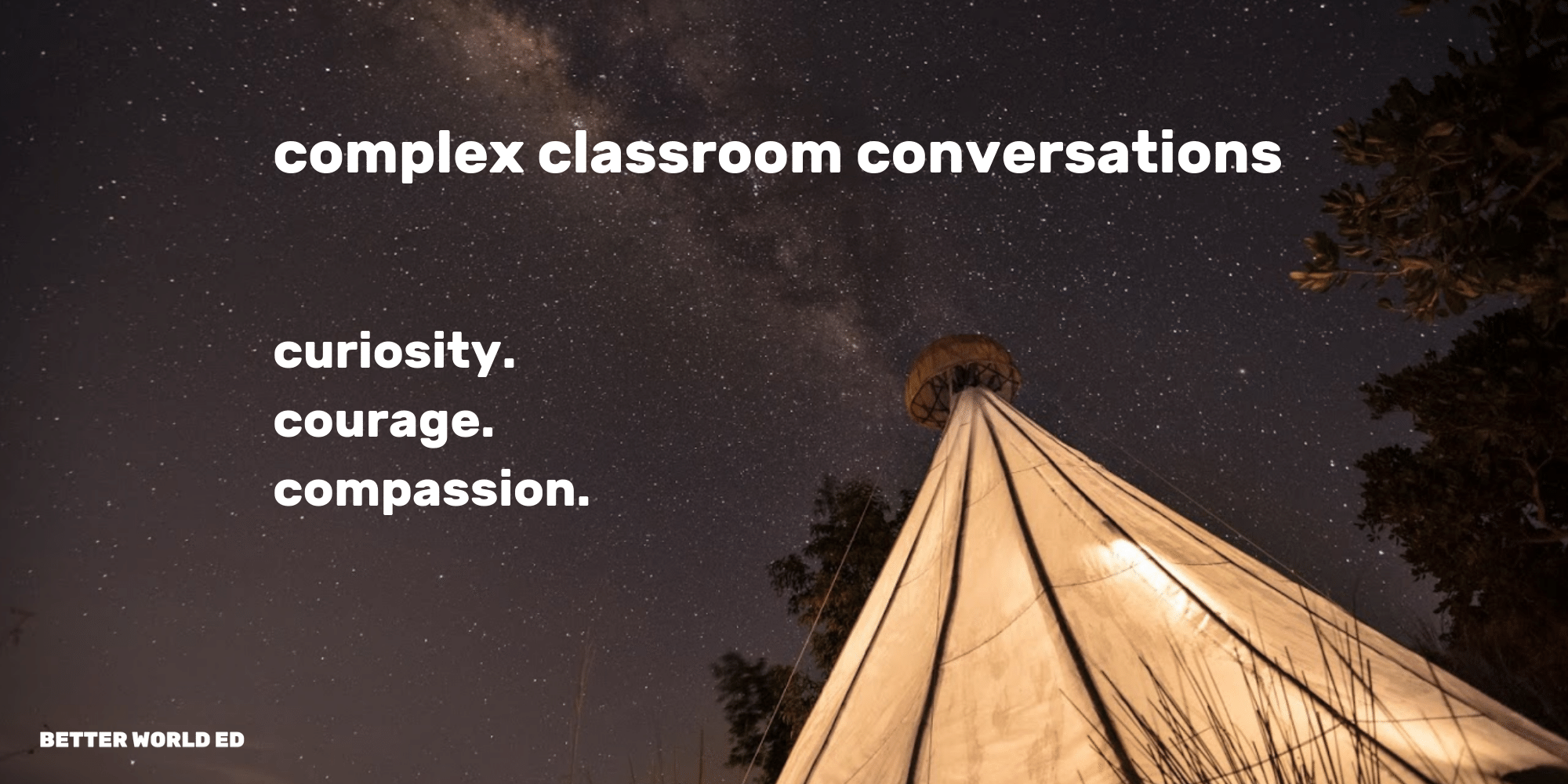What do you do when your student asks a big, hard, nuanced question about self, someone else, or a big important topic like inequity? Let’s explore how we might make those moments more meaningful and inclusive for all of us.
We want to encourage those moments more in our classroom conversations and our lives, rather than hiding from them consciously or subconsciously. Together, let’s learn to see the magical opportunity for growth that exists in these big complex classroom conversations.
Here is a sampling of some readings and resources Better World Ed has found helpful in our own team and classroom conversations, all created by organizations and humans we are grateful for:
- The Anatomy of Peace: many educators in the Better World Ed network have shared this book had a transformative impact on how they lead, hold space, and generally engage with self and others. This might be a book to consider for your middle or high school students. And for you!
- NPR shares a wonderful, friendly read about labels and terms. What do we call different kinds of countries? How do we categorize, if we categorize at all? Is it okay to use the term Third World or Developing World? Let’s explore the importance of thinking deeply about the words and terms we use to categorize and label in our lives.
- This piece talks about countries, but we can sure apply it far beyond that too!
- As we dig in to this article, a few questions to ponder: “How might we more effectively have conversations about the different countries and cultures in BetterWorldEd.org Learning Journeys? How might we support a meaningful, deep conversation about different countries in class, rather than letting perspectives of narrow beliefs / broad bucketing of cultures / judgment dominate the conversation explicitly or implicitly?”
- Byron P. White writes about how we can move Beyond A Deficit View. “Administrators and faculty members desperately need a new language to characterize minority, low-income and first-generation students — one that frees us from dependence on labels such as “disadvantaged.” In this article, we can begin to further explore what it means to focus on the strengths and assets (“asset-based frameworks”) we all have and bring to the room, rather than focusing on deficits in our thoughts, words, and actions.
- Dave Paunesku shares why it’s so critical we move beyond the deficit view/lens of the “Achievement Gap” to focus more on measuring a student’s opportunity, not their mindset or grades. As we all know deep down, there are so many structural and systemic reasons why some “achieve” and why some don’t, and those reasons tie into what we even mean by “achievement” (not a term agreed on by all humans).
- Have you ever heard the term “At Risk”? It’s very likely. And there’s a lot of question as to whether this term is one that is helpful for bringing us together as a society and addressing long-standing challenges we face in creating a more just, equitable world. In this piece, Ivory Toldson helps us reflect on why the term “at risk” can be so socially and emotionally dangerous for all of us and for our youth. He also shares great insights on what we can do to move beyond this term and other such terms. All another look at the concept of Deficit View and labels/terms.
- Teaching Tolerance’s Webinars and Other Resources: Teaching Tolerance has tons of awesome resources around how we can have more effective and more courageous conversations about challenging topics.
- Exploring the word “tolerance and moving Beyond Tolerance: TED Radio Hour explores moving Beyond Tolerance towards Deeper Understanding. “Most of us were raised to believe that tolerance is a good thing, but is it enough or just the bare minimum?” Another take on Moving Beyond Tolerance from the Desmond Tutu Peace Foundation.
- A Self-Assessment by Teaching Tolerance: If you don’t get a chance to browse deeply on the TT site, here’s a practical resource they share. Prepare for difficult conversations about race and racism with this important self-assessment by Teaching Tolerance. This might also act as a solid base for creating similar self assessments around other important topics and conversations you seek to have.
- Why We’ve Got to Talk About Race If We Want to Achieve Education Equity: Danielle M. Gonzales shares some important ideas in this piece. “Most importantly, we must look beyond the safe space of income inequality and talk about race and racism in our schools and education systems.” Perfect for your next classroom conversation when you feel like digging into something deeper than your math lesson. Bonus: want to weave math into your equity conversations? Check this out!
- Why We Can’t Afford Whitewashed SEL: Dena Simmons on why it’s so important we have courageous conversations in our classrooms. A powerful reminder and great inspiration as we work to have these conversations more often and more meaningfully in our classrooms.
- To Foster Social Emotional Learning, First Confront Our Own Biases: Liz Kleinrock shares why it’s so important that we not only focus on developing SEL for and with our students, but also for and with the teachers and school leaders we work alongside.
- Restorative Justice Perspectives: Daisy Yuhas writes about research and experiences related to how we can move away from “traditional” disciplinary practices towards more community-based and community-minded approaches in our classroom conversations and beyond.
- Have you ever felt it’s difficult to pronounce a “hard” name? I’ve heard for almost my entire life in the US that it’s “hard to pronounce Abhinav” (my full name). So in the US, my name became Abhi. And as I read this piece by N’Jameh Camara who shares perspective on this in this wonderful writing I couldn’t help but tear up. Let’s explore the difference between a “hard” name and an “unpracticed” name, as every name fits into the latter category in an inclusive, caring world.
- From National School Climate Center (NSCC), some great resources on connecting communities of courage.
- BetterWorldEd.org has real world, authentic stories from all around the world that dig into all kinds of complex conversations that ask for courage, compassion, curiosity, and creativity. The stories help us dive into these complex conversations even in the heart of our math and literacy classes, whether in school or for homeschooling!
Together, we can learn to come together and have complex classroom conversations with ourselves, others, and grounded in courage, grace, awareness, and deep understanding. The aim is for a world where we move beyond the single story to see one another as unique, beautiful humans. A world where we Be WE early in life, every day, and everywhere.
This an adaptation of an article originally published on Better World Ed.







